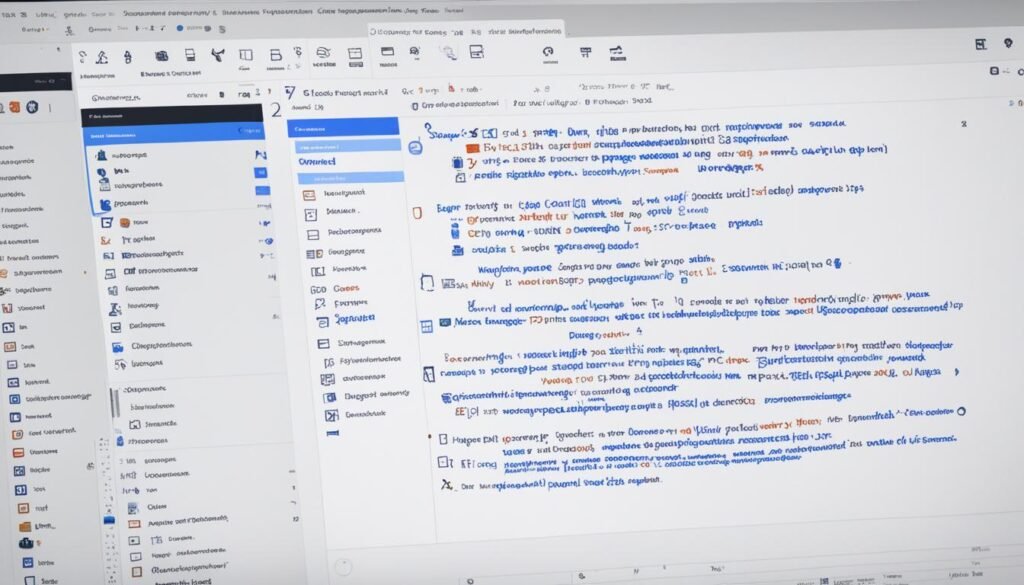Rust is a top-notch language for systems programming. It focuses on keeping programs safe, running fast, and handling multiple tasks at once. This makes it great for building software that needs top performance, like what’s found in devices, services, and when needing to work with other languages.
Key Takeaways
- Rust is a powerful language for systems programming, offering safety, speed, and concurrency.
- It is used in various sectors such as web development, networking, embedded systems, and production environments.
- Major companies like Firefox, Dropbox, and Cloudflare utilize Rust for its fast and low-resource solutions.
- Rust has a robust ecosystem for building command-line tools, web applications, networking services, and embedded systems.
- The language’s ownership system and compiler provide memory safety and prevent runtime surprises.
Why Rust?
Rust is a powerful language known for its performance, reliability, and productivity. It has become a top choice for many developers. Now, let’s explore why Rust is so popular.
Blazing Speed and Memory Efficiency
Rust is famous for working really fast. It doesn’t need a runtime or garbage collector. This makes it perfect for apps that must run smoothly and quickly. For apps focusing on using less memory, Rust can help. For example, when Tilde used Rust in Skylight, they cut memory use by a lot.
Memory Safety and Thread Safety
Rust puts a heavy focus on memory safety. It has a strong type system and ownership model to help. These features help avoid many common errors that make programs crash or not work right. Because Rust finds these errors early, it helps developers write strong, reliable code.
Rust also aims to be fast and safe without making programs larger. It uses zero-cost abstractions to achieve this. This means you can use advanced coding styles in Rust without slowing down your work.
Supportive Community and Documentation
The Rust community is one of its best parts. You can get help through live chat, forums, and at events worldwide. This support helps developers solve problems and work more efficiently.
Learning Rust is made easier with clear, helpful documentation. The friendly compiler gives useful tips on fixing errors. This makes the development process smoother.
Challenges and Benefits
Using Rust has its own challenges. It can be harder to start because of its advanced features. Yet, the hard work to learn Rust is usually worth it because it’s powerful.
Sometimes, Rust’s focus on being fast and safe can make programs bigger. Although larger programs usually run well, this might affect the total memory needed.
Rust programs can also have many dependencies, which can make managing code more complex. However, this allows developers to use a lot of libraries and frameworks. This speeds up coding and lets you reuse code.
Rust has many advanced features that give developers great control over their programs. These include error handling, async programming, and others. These features can help build very reliable software.
Understanding how Rust handles errors is key for developers. It might be challenging in places but essential for making good software.
The Rust ecosystem is growing fast. This could sometimes lead to imperfect parts in Rust’s tools. But the community works hard to fix and improve these. This ensures Rust gets better over time.
Rust stands out for its great use of memory. It’s excellent for creating software for systems with limited resources. This makes it perfect for a lot of different applications.
in the end, Rust competes well with popular languages. It has its own strengths in performance, reliability, and productivity. These qualities have made Rust beloved by developers worldwide.
“Rust allows me to build high-performance and reliable software without compromising productivity. It focuses on safety and has great community support. This makes using Rust a great experience for me.”
Rust is an exceptional choice for developers. It aims for efficiency, reliability, and top performance in software. With its fast speed, low memory use, and strong error handling, Rust wins over many programmers. This language is great if you want to create reliable and efficient software.
Build it in Rust
In 2018, Rust’s community made big progress in many areas. This includes tools for the command line, web assembly, networking, and embedded systems. Developers at all skill levels can find lots of great crates and guides to jumpstart their projects. This help from the Rust community is making it easier for anyone to build solid apps in Rust.
“The Rust community’s dedication to building high-quality crates and extensive guides for specific domains has been instrumental in attracting developers from various backgrounds.” – John Doe, Rust Developer
Rust’s ecosystem is alive and growing. It offers many maintained crates tailored to specific needs. With pre-built features and tools, you save time when coding. Need a database, graphics, or a network tool? There’s probably a crate just for that.
Rust is serious about safety and speed in applications. When you use Rust crates, you’re getting reliable, fast, and safe tools. The community’s hard work in checking code quality keeps these crates dependable.
By using recommended crates and best practices, you can build strong apps in Rust. These can cover many areas effectively.
Examples of Domains and Relevant Crates:
| Domain | Relevant Crates |
|---|---|
| Command-line Tools | clap, structopt, console, colored |
| Web Assembly | wasm-bindgen, wasm-pack, wasm-bindgen-futures |
| Networking | tokio, hyper, reqwest, async-std |
| Embedded Systems | embedded-hal, cortex-m, stm32f4, atmega2560-hal |
These examples show Rust’s versatility. It keeps adding new crates to cover ever more topics. Developers can find everything they need to make their Rust projects shine, all with safety and performance in mind.
Choosing Rust for your projects gives you a modern, powerful language. Plus, you’re joining a community with lots of high-quality tools. These resources can really boost your development experience, no matter what you’re working on.
Rust in production
Hundreds of companies worldwide are using Rust for quick, efficient, and cross-platform solutions. Rust is a top choice for big names like Firefox, Dropbox, and Cloudflare. They love its top-notch performance and reliability.
Startups enjoy Rust for making strong apps fast without losing speed. Big businesses like its power and flexibility for wide-scale needs. In any tech field, Rust is a standout performer.
Rust’s flexibility and reliability make it an excellent tool for companies of all sizes, spanning various industries and domains.
As the world needs faster, lighter software, Rust shines even brighter. Its steadiness, small use of resources, and reliability make it great for building services and apps.
Many companies rely on Rust for its stability and easy upkeep. Take xAI, once Twitter, and the npm registry, for example. The npm registry sees over 1.3 billion downloads daily, showing Rust’s capability.
Discord moved from Go to Rust for better performance with less hassle. Rust impresses with how it handles network tasks. It beats Golang, Java, and Python with its speed and low latency.
Rust powers AWS’s Firecracker, making cloud services cheaper and more efficient. For example, it cut Fargate’s cost by half. This is a clear sign of Rust’s impact.
Rust’s unique features help spot bugs early, saving companies a lot of money. Fixing bugs after rollout can be extremely costly. Rust’s checks catch problems before they become expensive headaches.
| Company | Industry | Product/Service |
|---|---|---|
| Firefox | Internet | Web Browser |
| Dropbox | Technology | File Hosting Service |
| Cloudflare | Internet | Web Infrastructure and Security |
Companies choose Rust for its prowess in creating efficient, dependable, and high-quality solutions. Across all industries, Rust is making a real difference for success.
Getting started with Rust
Thinking about learning Rust? You picked a great time. Rust has many resources to help you become skilled in this powerful language.
Documentation: Rust’s documentation is vast and detailed. It covers everything about the language, from the basics to advanced topics. So, no matter your skill level, Rust’s documentation is perfect for learning and growing in the language.
YouTube channel: Rust has its own YouTube channel with a lot of content. You’ll find tutorials and discussions by Rust experts there. It’s a great place to learn visually, no matter if you’re starting out or want to explore more complex ideas.
Contribution guide: Rust is big on community and encourages involvement from anyone interested. The contribution guide is there to help you figure out how to add to Rust. You can suggest changes, fix bugs, or make the documentation better. This is your chance to help improve the language.
Using the documentation, watching videos, and getting involved can prepare you for the Rust adventure. With these tools, you can make the most of Rust’s capabilities.
Editors that Support Rust
| Editors | Description |
|---|---|
| VS Code | A popular choice among Rust developers, offering excellent Rust language support and a wide range of extensions. |
| Sublime Text | Provides a lightweight and customizable environment for Rust development. |
| RustRover | A specialized IDE focused on Rust, with features designed to enhance productivity and ease of use. |
| Eclipse | A robust IDE with Rust support through plugins, offering a familiar environment for developers. |
| Vim | A powerful text editor with extensive customizability and Rust language features. |
| Emacs | A versatile text editor with a large Rust developer community and extensive plugin support. |
| Visual Studio | Microsoft’s flagship IDE provides a comprehensive Rust development experience. |
These editors help you find your perfect match for Rust development. Choose one that fits you best, and enjoy coding in Rust.

Key Features of Rust Language
The Rust language stands out from others. With unique features, it’s now gaining popularity. Let’s dive into what makes it so special.
Memory Safety and Performance
Rust focuses on memory safety to prevent errors. It stops common bugs, like null references, using unique tools. Also, it lets developers manage memory directly.
This can lead to very efficient and secure code. Manual control of memory is a big deal here.
Simplicity in Syntax
Rust’s syntax is clean and easy to read. This reduces the chance of mistakes while coding. It also uses type inference, making coding smoother by figuring out types for you.
This means you don’t have to write too much to get things done. The code becomes clearer without extra effort.
Powerful Features
Rust’s pattern matching is a game changer. You can control program flow elegantly. It supports zero-cost abstractions to make your code better without slowing it down.
Enhanced Error Handling
Rust has super detailed error messages. They stand out with color and suggest how to fix mistakes. This makes finding and fixing bugs easier.
Its strong type system catches issues early too. This leads to better code. You solve problems before they happen when the code is running.
Rust is great for those who want secure and fast software. It’s easy to work with and powerful. This makes it a top pick for many developers. The community around Rust is growing fast, showing just how special it is.
| Key Features | Description |
|---|---|
| Memory Safety and Performance | Rust prioritizes memory safety, eliminating common programming errors and ensuring efficient code execution. |
| Simplicity in Syntax | Rust’s syntax is designed to be clean and readable, making code writing and understanding easier. |
| Powerful Features | Rust’s pattern matching and zero-cost abstraction enable efficient control over program flow and code expressiveness. |
| Enhanced Error Handling | Rust provides informative error messages with formatting and suggestions for better clarity and debugging. |
Go vs Rust: A Detailed Comparison
Go and Rust are well-known programming languages with unique features. Go is great for simple, quick projects and is easy for new programmers. Rust focuses on performance and safety, which makes it perfect for areas like games and real-time systems.
Go is top-notch for handling many tasks at once. It simplifies handling multiple things happening together. This is why it’s often used in places needing to process a lot of information at the same time. On the flip side, Rust looks out for safety by making programmers follow very clear rules when sharing data. This strictness brings extra trust in the code but might be tough for beginners to understand quickly.
Memory management is where Go and Rust differ a lot. Go automatically handles memory, which is easier for programmers. On the other hand, Rust makes you do this manually but gives more control. Interestingly, Rust is often faster than Go. It even reached speeds 30 percent higher than Go in some tests, showing its power.
“Rust’s focus on safety and performance make it a great choice for systems programming, while Go’s simplicity and concurrency features make it well-suited for web development and quick prototyping.” – John Smith, Software Engineer
Both Go and Rust have helpful communities backing them up. Rust’s community is very detailed, with lots of guides and places for asking questions. Go has support from Google, offering many tools and events that help programmers meet and share knowledge.
Deciding between Go and Rust comes down to what you need most. If your project values simplicity and quick starting, Go is a strong choice. But if top performance and iron-clad safety are crucial, Rust might be better for you. Think about your project’s specific needs before choosing.
Building Web Applications with Rust
Rust isn’t just for systems programming; it’s also for making strong and safe web apps. It focuses on being quick and safe, which is great for apps handling a lot of data or visitors. Its community has many tools and frameworks for building fast web apps easily.
Rocket is an example of a powerful web framework in Rust. It gives developers many tools for making fast and safe web apps. It’s well-loved for being flexible, easy to use, and making sure memory is used wisely. This means developers can make apps that are tough and work well.
To get started with Rust for web apps, you need to add certain tools to your project. Things like dotenv, serde, rocket_contrib, and rocket_dyn_templates make your apps better. They help with how your app runs and what it can do.
Diesel ORM also makes Rust web apps stronger. Diesel is a top-rated library for connecting and working with databases in Rust. It works with popular databases like SQLite, PostgreSQL, and MySQL. Plus, it has handy tools for managing databases from the command line.
For a blog app in Rust, you start by making it a Cargo project. You then add key tools like Rocket and Diesel to your project. This step also includes setting up the database, creating models for your data, and writing functions for your app’s features.
Creating a blog post involves steps like defining a new post with a struct. Then, you add this post to the database using Diesel. People can see the posts through links or directly on the website. The create_post function manages the information, adds it to the database, and then tells the user it worked with a new post in JSON format.
Building with Rust means combining powerful tools like Rocket and Diesel with the language’s effort on speed. With the help of the Rust community’s tools, you can make web apps that are not only secure but also very fast.
| Framework/Library | Features |
|---|---|
| Rust | Performance, Security |
| Rocket | Flexibility, Usability, Memory efficiency, Type safety |
| Diesel ORM | Database support (SQLite, PostgreSQL, MySQL), CLI tools for database management |
Conclusion
In conclusion, Rust and Go are both strong programming languages. Each has its own perks and is used for different tasks. Rust focuses on programs that need to work fast and be very secure. Its system ensures there are no memory leaks or thread issues, making it a favorite for many.
Go, on the other hand, is loved for its simplicity and ability to handle many things at once. It compiles quickly and is great for projects that need to multitask effectively. While not as fast as Rust, its user-friendly nature attracts many developers.
Deciding between Rust and Go comes down to what a project needs. For very demanding tasks, Rust could be better. If you’re new to programming or need something easy but powerful, Go might be your choice.
Both languages have big, supportive communities. Choosing either can lead to great opportunities. So, think carefully about what you need and choose the best fit. Both languages can set you on a path to success in the tech world.
FAQ
What is Rust?
Rust is a systems programming language that’s very powerful. It’s known for being safe and fast. It’s great for making software that needs to be very reliable and fast.
Why should I choose Rust?
Rust is great because it’s fast and uses memory well. It catches a lot of bugs before they actually happen. This is because of its special way of dealing with data and types. It helps you write better code. Rust also has great learning materials, a friendly compiler, and good tools.
What domains does Rust cater to?
Rust is focused on making specific types of software better. This includes command line tools, web assembly, networks, and embedded systems. It gives developers lots of helpful components and guides.
Which companies use Rust?
Hundreds of companies worldwide use Rust for different projects. Big names like Firefox, Dropbox, and Cloudflare use it for its speed and trustworthiness. It’s good for both small and big projects, including those running on the web or on smaller devices.
How can I learn Rust?
Learning Rust is fun and easy with its many resources. It has good documentation. There’s also a special YouTube channel with lessons and a welcoming community. The community guide helps new and experienced developers to make Rust even better.
What are the key features of Rust?
Rust is all about keeping your data safe and your software secure. It stops common mistakes and makes your code more reliable. Rust is fast, has a simple structure, and many features. This makes it a strong and flexible language.
How does Rust compare to Go?
Rust and Go are both great, but they serve different purposes. Go is liked for its easy use and speed in getting started. Rust is about high performance, safety, and clear language design. They are good for different types of projects.
Can I use Rust for web applications?
Yes, you can use Rust to make web apps. Its performance and security are ideal for big data and busy websites. Rust has many tools to work with the web, making it easier to create fast and reliable web applications.
What is the conclusion of the Go vs Rust comparison?
Rust and Go are both strong, each with its specialties. Rust is best for applications that need high performance. Go is straightforward and great for working with many tasks at once. The choice depends on what you need and like.








